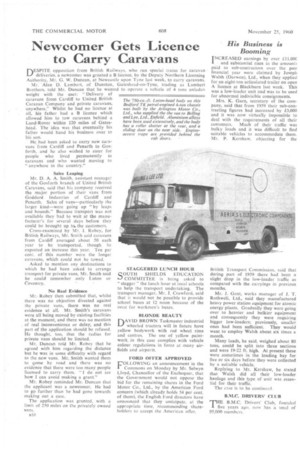Newcomer Gets Licence to Carry Caravans
Page 44

If you've noticed an error in this article please click here to report it so we can fix it.
DESPITE opposition from British Railways, who run special trains for caravan deliveries, a newcomer was granted a B licence, by the Deputy Northern Licensing Authority, Mr. G. W. Duncan, at Newcastle upon Tyne last week, to carry caravans.
He had been asked to carry new caravans from Cardiff and Penarth to Gosforth, and he also wished to cater for people who lived permanently in caravans and who wanted moving to "anywhere in the country."
Sales Leaping Mr. D. A. A. Smith. assistant manager of the Gosforth branch of United British Caravans, said that his company received the major portion of their vans from Goddard Industries of Cardiff and Penarth. Sales of vans—particularly the larger kind—were going up " by leaps and bounds." Because transport was not available they had to wait at the manufacturer's for several days before they could be brought up to the customers.
Cross-examined by Mr. I. Robey, for British Railways, Mr. Smith said caravans from Cardiff averaged about 50 each year to be transported, though he expected an increase this year. Ten per cent. of this number were the longer caravans, which could not be towed.
Asked to mention any destinations to which he had been asked to arrange transport for private vans, Mr. Smith said he could remember only Luton or Coventry.
No Real Evidence Mr. Robey then submitted that, whilst there was no objection directed against the private vans, there was no real evidence at all. Mr. Smith's caravans were all being moved by existing facilities at the moment, and there was no mention of real inconvenience or delay, and this part of the application should be refused. He thought, too, that the radius for private vans should be limited.
Mr. Duncan told Mr. Robey that he agreed with him regarding the distance but he was in some difficulty with regard to the new vans. Mr. Smith wanted them to some by road and there was no evidence that there were too many people licensed to carry them. " I do not see how I can avoid making a grant" Mr. Robey reminded Mr. Duncan that the applicant was a newcomer. He had to go further than he had gone towards making out a case.
The application was granted, with a limit of 250 miles on the privately owned vans.




















































































































